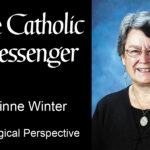All through Advent we sing longingly, “O Come, O Come Emanuel and ransom captive Israel.” The theme of exile is woven into the Christmas story — in the Gospels proclaimed in the Vigil Mass for the Nativity of Our Lord and in the Mass for the Feast of the Holy Innocents, Martyrs. Jesus and his family are exiles, fleeing murderous persecution. Hundreds of families in the Diocese of Davenport are living this experience of exile afresh as refugees, many of them finding refuge in Iowa City, Coralville and Columbus Junction. It is not an easy life. The United Nations confers refugee status when an individual can establish a well-founded fear of persecution if he or she were to return home. It is a years-long process.
Christmas Time should heighten our awareness of the 65 million refugees worldwide, and inspire us to be a welcoming presence in our parishes, homes, schools, businesses and greater community. This past fiscal year (2016), 995 refugees arrived in Iowa, some of them in our diocese. They come from Burma, Bhutan, Iraq, Syria, the Democratic Republic of the Congo, South Sudan and other countries where conflict is roiling.
Nyota, her husband Bugoma and their son Clovis are among a growing population of 2,000 Congolese refugees in the Iowa City area. Like many newcomers, they must grasp an entirely different culture, climate and lifestyle while working to put food on the table and a roof over their heads. One of Nyota’s observations about living in Iowa should cause us to pause. People close their doors; they go home and keep to themselves. We have to work just that much harder in our faith communities to not fall through comfortable patterns of interpersonal indifference.
Refugees desire to flourish in their new homeland, but they need a hand up to achieve self-sufficiency. Research shows that over time, refugees who have been resettled have a positive or neutral impact on the economy of their host country, according to Community West Blog of Westlake, Ohio. A 2012 study of refugees in Cleveland, for example, showed a positive economic impact, the blog noted. Refugees contribute to the U.S. economy and we’re better off because of it.
In Iowa, the Bureau of Refugee Services coordinates refugee programming and collaborates with two voluntary agencies in Iowa: The U.S. Committee for Refugees and Immigrants (USCRI) and the U.S. Conference of Catholic Bishops (USCCB). Most of the resettlement is occurring in Des Moines and Cedar Rapids, said Loren Bawn, the bureau’s operations manger. But pockets exist in other parts of the state such as Iowa City, Coralville and Columbus Junction.
A Dec. 14 meeting of state and local groups on refugee resettlement in Johnson County concluded that more resources are needed to assist the county’s refugee population. Iowans are willing to assist, but want to know what they can do.
Here are some suggestions, culled from a variety of sources:
• Learn about refugees and refugee resettlement in Iowa (http://tinyurl.com/jlaszv8). For a national perspective (refugees.org), and for a church perspective (http://tinyurl.com/zmhdrx6).
• If you are an employer, hire refugees. They’ve been strengthened by adversity and are capable, resilient and loyal employees. Diversity can enrich the workforce.
• If you are a landlord, be flexible in renting to refugees, some of whom have large families.
• Donate money, household goods, personal hygiene products, furniture, winter clothing.
• Volunteer to teach English, provide rides to appointments, jobs, church and the grocery store.
• Establish an awareness campaign at your parish or school and receive materials, literature and other resources by contacting Migration and Refugee Services Education and Outreach Coordinator at tscribner@usccb.org or call (202) 541-3208.
• Contact your legislators and members of Congress to provide funding for programs that help refugees with the resettlement process, such as AmeriCorps in Iowa City.
• Practice civility and tolerance with the cashier at the store or the housekeeper at your hotel.
• Many refugees are too polite to acknowledge miscommunication. Make sure you are being understood by asking more questions.
The small, vulnerable refugee whose birth we celebrate this Christmas spent his short adulthood teaching us how to live with one another. “I was a stranger, and you welcomed me.”
Barb Arland-Fye, Editor
(arland-fye@davenportdiocese.org)











